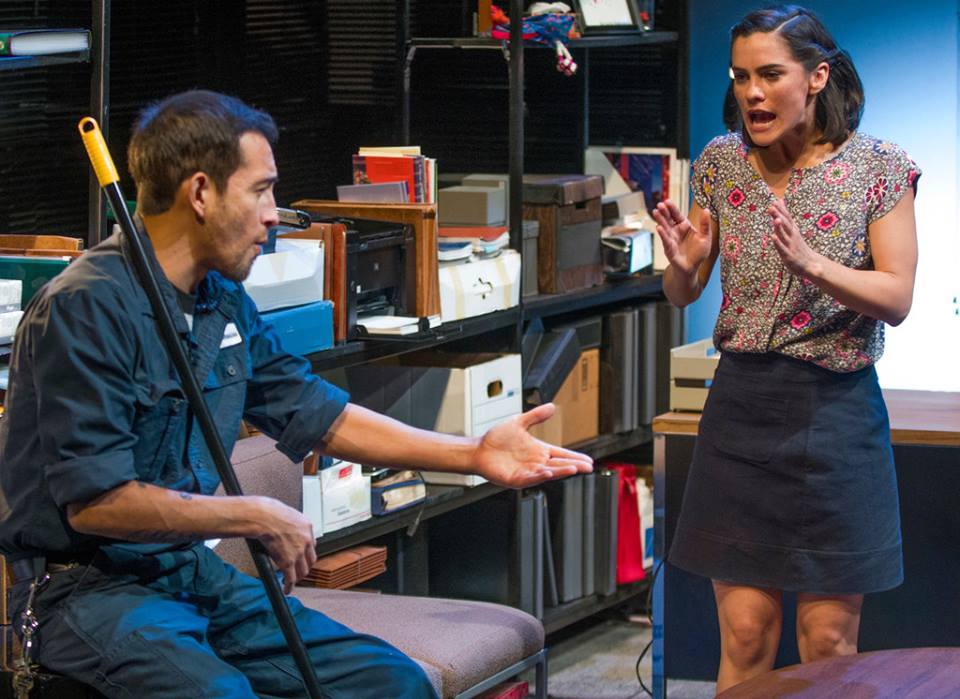Review: FADE at Dallas Theater Center

Dallas Theater Center's production of Tanya Saracho's new play Fade follows burgeoning author and screenwriter Lucia as she begins work at a television studio in L.A. The loneliness of a new city and unfamiliar field take their toll on her until she befriends Abel ([ah-bel] not [aye-bel]), her office custodian. Saracho's story is almost cheekily influenced by her own time as a television writer, though instead of being the Rom-Com one might expect from the aforementioned scenario, she uses the setting to cleverly approach the concepts of Latinx identity, class, and (in a silver-screen-reminiscent twist) appropriation in a way that is more personal than cultural.
Not much happens in Fade, that is to say it is truly a slice of life focusing on the relationships between two people and their surroundings. This is not an HBO sweeping cinematic, nor is it ABC family pastiche. TV influences abound, it plays as serial and almost episodic - in some ways, it feels like a love-letter to the complexity and irony of Saracho's own experiences. Our Saracho surrogate is Lucia, here played by an energetic Melisa Pereyra, a wealthy Mexican-born novelist who moves from Chicago to L.A. for a job to sustain her until she can finish her next novel. Though she writhes against the "old boys" club of the office, she eventually moves past her fears and embraces a sort of Mad Men-esque attitude towards success. Her transformation is more than catalyzed by her friendship with L.A. native Abel, here played by an endearing Franco Gonzalez, who helps her navigate her own identity in this new city as well as inspires some of her writing. These are the only two characters, and the 90ish minute run-time is almost entirely made up of their late-night conversations.
Uniquely, the play poses interesting questions about classism, what it means to be Latinx, and who within a population can claim certain aspects of cultural identity. These bits are almost always comedic, and as director Christie Vela notes, the play does succeed at revealing the complexities of Latinx life to members of other communities. Questions like "what kind of Latina" someone is, themes like Mexican Catholicism and mysticism, and the false assumptions made even within the Latinx community about who speaks Spanish or wants to all play out in thoughtful scenes that absolutely achieve what they set out to. Not to mention, the importance of a play about people that are played, written, and directed by members of the same community cannot be overstated.
While the new play is certainly enjoyable, and honestly refreshing in a LORT season, the episodic nature of the scenes does grow slow at times - though perhaps that is indeed the point. If I have a qualm, it is only that some of the physicality and movement is perhaps too exaggerated or "cheated" out, especially given that the show takes place in DTC's intimate 6th floor studio. With the intricate, detailed realism of Diggle's set design and Amanda West's wonderfully involved lighting, some of the characters' gesture or posture read a bit too hyper-theatrical, as did the climactic use of a Lana Del Rey track.
Fade tells a familiar yet refreshing story, but more importantly - it represents, honors, and has a conversation about the complexity of the Latinx experience in America today. These characters are not stereotypes, they have backstories and real feelings much like the characters Lucia struggles to write - these at times two characters may reflect the very issues they set resist. Even so, Fade presents timely topics that it is high time the Dallas community sees in an established space like DTC.
Fade runs in the Wyly Studio Theatre at Dallas Theater Center through January 7th. For tickets and information, visit dallastheatercenter.org.
Reader Reviews
Videos

